December 12, 2022
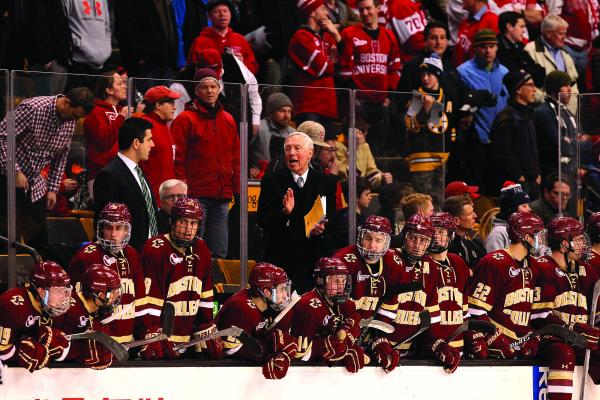
Jerry York in a most familiar place and posture: Behind his players, urging them on. John Quackenbos photo
By Elizabeth Clemente
Long before he became the winningest coach in college hockey history, Jerry York was the eighth of ten children growing up in a crowded home in Watertown, where clergy members often wandered through and strangers seeking medical care sometimes rang the doorbell at 3 a.m. Jerry’s father, the late Dr. Robert Stack York, was a physician at Saint Elizabeth’s Medical Center in Brighton who also treated the Jesuits at their facilities in Weston.
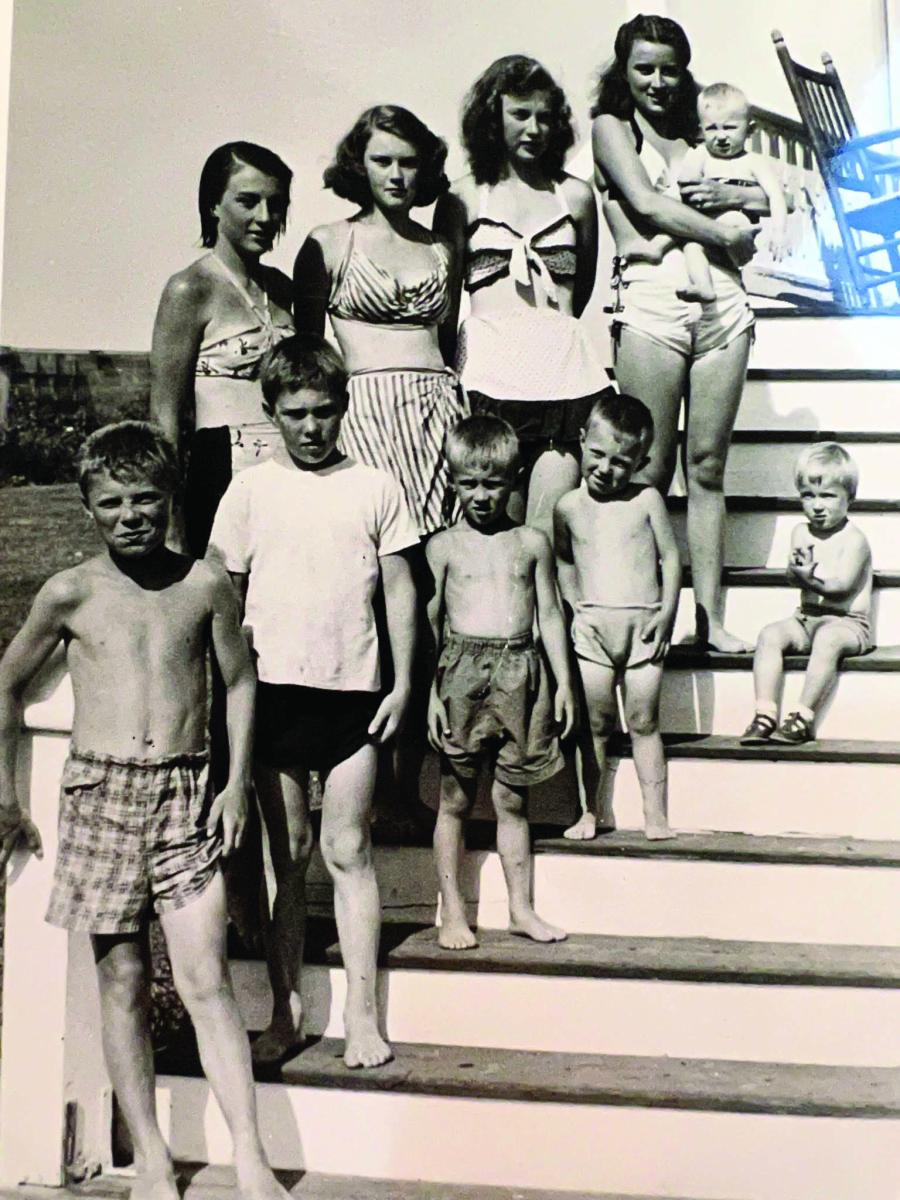
The York Ten: From top, Ann, with Billy, Sara, Pauline, Eileen, Peter, Bob. The little guys going up: John, Jerry, and Mary Ellen sitting down.
‘It was interesting because his practice was on the first floor of the house,” Jerry said in a recent interview, “so we’d be out in the backyard playing hoops or street hockey or something, and all of a sudden he’d bang on the window and say ‘I can’t hear the stethoscope.’”
The York family was a blended one, though, says Jerry, it never felt that way. Dr. York had six children, Ann, Sara, Pauline, Eileen, Robert, and Peter, with his first wife, Catherine, before she passed away from cancer. He later met Jerry’s mother, Mary York, (née Conlon), while she was working as a nurse at St. Elizabeth’s. The pair married and had four more children together, John, Jeremiah, Mary Ellen, and William.
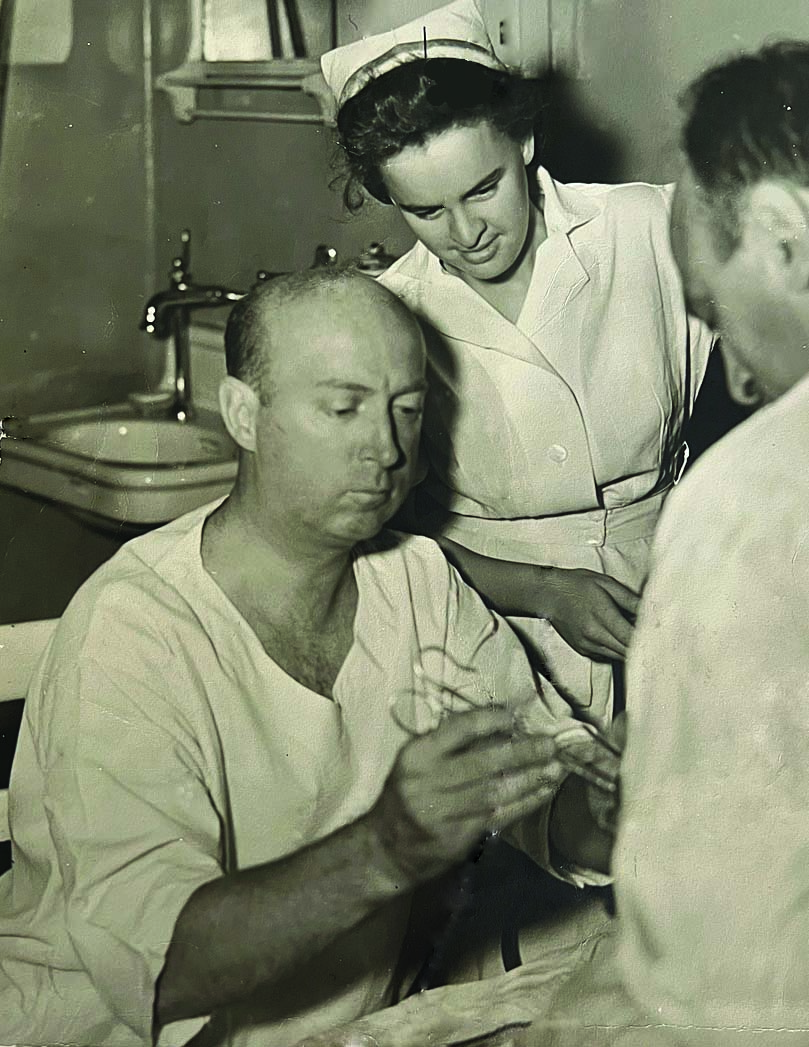
Concentration Central: Dr. Robert Stack York, a nurse at his shoulder, checks out a patient. Courtesy of the York Family.
Dr. York was a stickler for having all 12 family members sitting down for meals together — a fun challenge considering the nearly 20-year age gap between the oldest and youngest siblings. Navigating that loving chaos early on might have helped prepare Jerry to face the high-stakes world of college hockey with his signature resilience. “I had the chance to look to my left and see two younger siblings, but for the most part, everyone was older than I was,” he said. “You learn a lot from that. It was kind of like a team growing up.”
Jerry’s legendary Division I coaching career spanned 50 years at three universities: Clarkson, in Potsdam, NY, Bowling Green State, in Ohio. And, of course, his alma mater, Boston College, from which position he retired in April of this year after 28 years of coaching the Eagles and posting an astonishing 1,123 wins and five national championship titles under his name. No other coach in the history of college hockey has won 1,000 games.
Jerry led his players to the NCAA tournament 18 times, won 12 Hockey East regular-season titles, 9 Hockey East Tournament titles, and 9 Beanpot titles. He has coached four Hobey Baker Award winners, and 58 of his former players have gone on to play in more than 50 NHL games. He was also named the Hockey East Coach of the Year five times, and has been inducted into both the Hockey Hall of Fame and the US Hockey Hall of Fame.
Considering all of that, it is interesting that he is as well known in Boston for his kindness and humility as for his long list of record-shattering accomplishments. He announced his retirement from BC, which inspired dozens of articles and tributes from national news outlets, with a simple press release. It was a gesture characteristic of the lack of fanfare that he preferred over the years.
“Jerry is as humble and as giving as you can be,” said his younger brother Bill, who today lives down the street from Jerry in the house they grew up in. His ability to communicate with people, Bill added, is unmatched, and largely driven by his down-to-earth personality. “Jerry is not only a brother in a big Irish family but he’s my best friend and he has been forever,” he said. “He’s a special guy, and a lot of it in my mind has to do with his simplicity and boundless enthusiasm and optimism.”
Like in many Boston families of that era, the Irish Catholic influence in the York house was strong. Both sets of Jerry’s grandparents immigrated to the United States from Ireland. Dr. York’s parents, who passed away before Jerry could meet them, came from County Cork, while Mary’s parents hailed from County Mayo.
According to Bill, the York family’s roots in Watertown date back to the nineteenth century, when a relative of his father came to the area and acted as a principal developer of St. Patrick’s Church on Main Street. “It was one of the big Irish enclaves in Watertown and in the Boston area,” Bill said. “He came here and became very much involved with the community.”
Mary’s side of the family settled in Clinton, Mass., where many of them found work in the mills and where their descendants live today. That influence instilled a strong work ethic in the York children. “If Jerry scored a hat trick, the first question he got when he got home was, ‘How did you do on your Latin homework?’” Bill said. “There was a strong sense of discipline, but at the same time the Irish know how to celebrate, too. There was a strong sense of love.”
Hockey, on the other hand, was not a focus of the York family during Jerry’s childhood. Dr. York had run track while studying at Georgetown, but did not push any of his children to become athletes. Jerry first learned to skate from Jesuits on a pond in Weston while visiting his father at work. Unlike in South Boston and Dorchester at that time, Jerry said there was no youth hockey culture in Watertown — a flooded tennis court served as his practice rink. The first organized team he ever tried out for was the freshman squad at BC High, where he was coached by the late Rev. Leo Pollard. But Jerry’s high school hockey career gave little inkling of the greatness to come.
Peter Capobianco was two years behind him at BC High and later at BC, and played hockey at both schools. Jerry didn’t make the varsity team at BC High until his junior year, Capobianco said, and he wasn’t as widely recognized as players who came from nearby hockey factories like Arlington, Melrose, Walpole, or Norwood. Instead, he worked to become what Capobianco called a self-made hockey player.
Mark Mulvoy, the editor-in-chief of Sports Illustrated, with a stint in the middle as publisher, from 1984 to 1996 and a life-long assessor of hockey talent, graduated from BC High four years before Jerry. He remembers watching him play for what were then called the Eaglets. His talent as a hockey player, Mulvoy said, was evident right off the bat. “For a little kid he was tough, with good balance and hard to knock off the puck. He knew how to move the puck forward, he didn’t get stuck places.”
Said Capobianco: “He went from somebody coming out of BC High with some recognition, but not really widespread, to a walk-on at BC. And then through all of his hard work and dedication he became captain of the BC team and an All-America hockey player.”
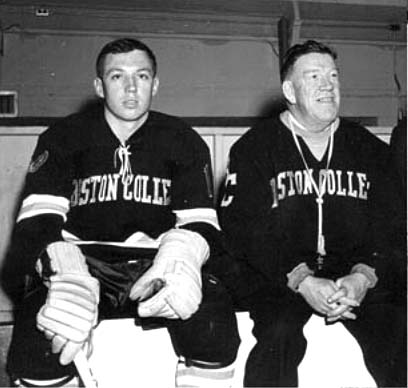
Jerry, captain of the Boston College hockey team in the mid-1960s and an All-America selection, beside his coach, the legendary John A. “Snooks” Kelley, himself the winner of 501 games behind the Eagles bench. Boston College photo
Jerry still ranks among BC’s all-time leaders in points, goals, and assists, posting 134 points for the Eagles during his college career. He credits his college coach, John “Snooks” Kelley, as being a major influence who helped inspire his future coaching insights.
For all his success at hockey, Jerry also experienced two pivotal life transitions while studying at BC. First, his father died suddenly during his freshman year. Bill, who was 15 and a student at BC High at the time, remembers it as being a difficult year for the entire family. Jerry had also begun dating his wife of 52 years, Bobbie York (née O’Brien), when they were both Eagles. The couple met when they were still in high school, as both of their families had summer cottages in Green Harbor, and reconnected at The Heights.
Bill eventually joined Jerry at BC and played hockey for part of his college career. The brothers remain close. “When you’re a younger brother and your older brother is very successful at a sport, it’s tough to match,” Bill said, “but it was never tough to match for me because Jerry was always more interested in how I was doing than how he was doing.”
After graduating from BC in 1967, Jerry was invited to join the 1968 US Olympic team. He was cut late in the process due to an injury. “I know that was a big disappointment,” Bill said, “but Jerry, in his usual way, just kept going with his tremendous optimism.”
Jerry also spent six months in the US Army reserve post-graduation, and then returned to BC to obtain his master’s in counseling psychology and work as a graduate assistant for the freshman hockey team. Then came his tenure at Clarkson, which began with a role as an assistant coach, followed by his becoming the youngest head coach in the nation at the age of 26. Coincidentally, the opportunity arose because Clarkson’s head coach, Lenny Ceglarski, was leaving to coach at BC.
Several of Jerry’s players at Clarkson were only a couple of years younger than him. He refers to that time as a “baptism of fire. I cut my teeth on hockey skills at Clarkson,” he said. “That was where I probably made a lot of mistakes that made me a better coach and a better leader.”
He was named NCAA Division I Coach of the Year while there in 1977. He and Bobbie also welcomed both of their children, Laura and Brendan, while living in Potsdam. Next came Bowling Green, where Jerry won his first NCAA title in 1984. Ten years later, he achieved his longtime dream of becoming the head coach at BC. In 2001 he led the Eagles to their first NCAA win in more than 50 years, and repeated the feat again in 2008, 2010, and 2012.
Mark Mulvoy, who had traveled around the world as a sportswriter and editor following hockey, says his favorite memory of his longtime friend’s work behind the bench was seen from the comfort of his couch at home as BC defeated the University of North Dakota for the NCAA championship in April 2001.
“I remember when Jerry was hoisting that little trophy they give you for the championship, watching it on television,” Mark said. “You could see that the seven years he had put in before that game, restoring a program, rebuilding a program, bringing class, and style, and integrity back into a program, it hit him – there it was. The smile on his face – you couldn’t put a price on it.”
Pat Mullane played for the Eagles during their 2010 and 2012 NCAA wins, and later became team captain. While he was growing up, he said, Jerry was a “mythological figure” that he idolized. Jerry pushed Pat and his teammates to become better hockey players, he saids, but also better people. “He never had a bad day in his life. That type of personality and excitement and positivity is contagious,” Mullane said.
Adds John Flaherty, head hockey coach at BC High since 2011, “When Jerry thinks about his career, I think he’s going to be just as proud of his accomplishments molding young men.” Flaherty said that Jerry has been a consistent coaching mentor to him over the years and also has remained involved with the BC High hockey program, often offering to host John’s players at BC to watch practices.
“He was a gentleman and treated his players with respect and demanded that his players respect the game and play the game the right way,” Flaherty said. “I don’t know of any coach who wouldn’t want to emulate that.”
Jerry notes that it was always important to him when choosing a career path to not just focus on the fundamentals of the job. Team bonding and how his players fit into the school were just as important to him as hockey skills. He credits his strong Catholic upbringing for that mindset. “What kind of husbands they were going to be down the road, and what kind of people they were going to be, was important to me,” he said.
In his first six months of retirement, Jerry has enjoyed time golfing at Oakley Country Club in Watertown, reading, and spending time with his family. He spent a week in July with seven fellow BC alumni on a golf trip in Ireland, and he hopes to travel more with Bobbi, especially to Pennsylvania where their his grandchildren live.
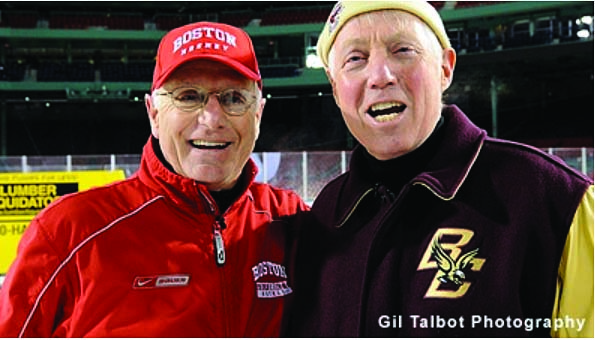
Mutual Admiration Society: Over 50 years, Jerry York (Watertown) and Jack Parker (West Roxbury) played against each other in high school (BC High vs. Catholic Memorial) and in college (BC vs. BU) and they coached against each other for 40 of them, with Jack at BU throughout, and Jerry at Clarkson, Bowling Green, and BC. Jerry won 1,123 games and 5 national titles in his career, and Jack won 897 games and 3 national championships in his. Superstar coaches, fierce competitors, and gracious men who readily and regularly acknowledged the other’s high competence. Gil Talbot Photography
This is his first autumn away from a college campus in some 54 years, but Jerry’s excitement for life remains the same. “I was on the phone with him this morning and he was talking about the joy in playing golf and doing different things,” Bill said. “Every day is a great day for Jerry.”
Mark Mulvoy has done his best to advise Jerry on life in retirement, including on what type of car to buy, how to improve his golf game, and the best way to switch his sartorial style upscale now that he can’t wear Boston College gear 24/7.
“He’s a kid of style, a kid of class, a kid of integrity,” said the 81-year-old Mulvoy about his 77-year-old “kid” golfing protégé. “He’s managed his life that way, but now we gotta get him into the real world.”
•••
Elizabeth Clemente is the staff writer at Boston College Magazine. Prior to joining the team at BC, she lived and worked as a newspaper reporter in Portland, Maine, and Nantucket for publications including The Portland Phoenix and The Inquirer and Mirror. A native of Salem, N.H, she is a 2017 graduate of the University of New Hampshire who currently lives in East Boston.

